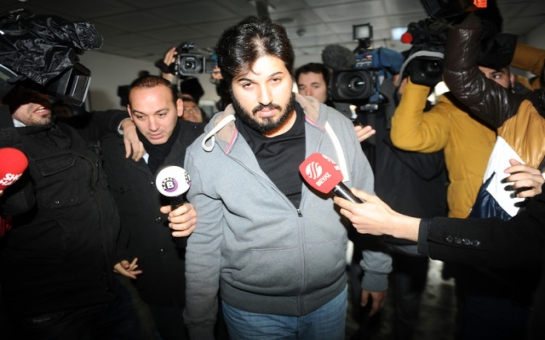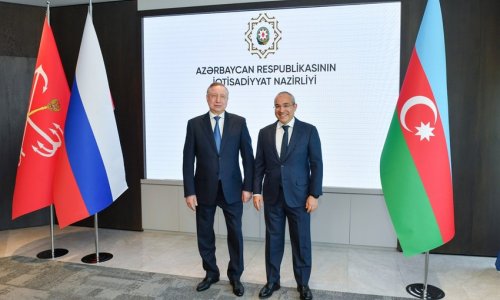By Mehul Srivastava
To catch a glimpse of the former life of Riza Sarraf, flip through the celebrity columns of Turkey’s newspapers.
Here he is, as a fluttering tarpaulin reveals a $72 million villa on Istanbul’s waterfront, a present for his pop-star wife, Ebru Gundes. Here he is, sitting near Prime Minister Recep Tayyip Erdogan at a government-housing ceremony. On another day, he clutches an award on a stage with Erdogan’s wife.
To catch a glimpse of his current life, flip through the manual for a Type T Prison in Istanbul, where Sarraf shares a room with four men and the entire prison population hangs out in a common room with a radio and a small kitchen. Once a day they’re allowed an hour of recreation on a basketball court.
The 30-year-old Iranian emigre, police and court documents say, is at the heart of a ring of bribery, forgery and gold-smuggling that has helped lead to hundreds of arrests in Turkey and the resignations of three cabinet ministers. Sarraf kept ministers on speed dial while plying them and their families with millions of dollars in cash and gifts, including a $37,000 piano and a watch costing at least $350,000 for one minister, and sped around Istanbul with a police escort arranged by another, the documents claim.
“It is certainly extraordinary for someone to manage to achieve these kinds of connections, and this volume of business so quickly,” said Wolfango Piccoli, the managing director of London-based Teneo Intelligence, who previously followed Turkey for Eurasia Group and writes reports on the country for clients. “The question is how did Sarraf manage to do that?”
Police Firings
Erdogan long has touted Turkey’s transformation into an economic powerhouse in a region populated by failed states as a principal accomplishment of his 11 years as prime minister. The arrests of Sarraf, and others close to the premier’s circle of power, show a different side of the story -- one where favors and bribery are said to have accompanied the financial success of his allies. If convicted, they would be the first casualties in a legal battle that could undermine Erdogan should he run for president in this year’s elections.
Since the first wave of arrests in the 15-month investigation occurred last month, Erdogan’s government has fired or reassigned almost 4,000 police officers as well as prosecutors and regulatory officials. The prime minister portrays the case as an attempted coup directed at his government and his family.
Private Jet
The crisis has taken its toll on markets: The benchmark stock index is down 15 percent since the first wave of arrests on Dec. 17. And it’s one reason why the currency fell to new records for 10 straight days through Jan. 27, when the central bank said it was scheduling an emergency rates meeting the next day. The bank announced at midnight today that it was increasing all its main interest rates, reversing years of policy as it seeks to stem the lira’s slide.
Sarraf’s journey from the life of a millionaire with a famous wife and a private jet to the subject of a 15-hour police interrogation is revealed in hundreds of pages of documents reviewed by Bloomberg News. They include court filings in Ghana and a secret transcript of his interrogation by Turkish authorities that also includes the content of police wiretaps and video surveillance of some of the country’s most powerful politicians.
Combined with public records on Sarraf’s business activities and interviews with key participants, the 126-page transcript and the documents show how a baby-faced immigrant with a middle-school education entered into the highest echelons of Turkish life. At weddings and government events, he mingled with the prime minister and sons of cabinet ministers, cadging favors and signing deals along the way.
Moving Gold
Sarraf’s rise in Turkish society happened as he was pressing against the boundaries of U.S.-led sanctions against Iran, designed to bring the Islamic republic to negotiations over its enrichment of uranium. As western nations ring-fenced Iran’s banks, they created a temporary market where gold could be used to pay Iran for its only major export: oil and gas.
That chaotic marketplace created opportunities for men like Sarraf. He used his connections in Iran and Turkey to move almost a metric ton of gold to Iran every day for 1 1/2 years, according to a person familiar with his finances. That quantity was worth more than $28 billion, according to data compiled by Bloomberg based on the average London price of the metal each month.
It all began to unravel when a mysterious flight took off on a warm New Year’s Eve from Accra, Ghana, a year ago. In Turkey, Sarraf was expecting it and its precious cargo, resting on 30 wooden pallets in the hold of the Airbus SAS A300, the transcript says.
Refueling Stop
The planned destination was Dubai, with a refueling stop in Turkey. When fog forced it to land at an unexpected Turkish airport and customs officials impounded the plane for not declaring its contents, Sarraf made phone calls to highly placed people, the interrogation transcript shows. It took more than two weeks to get the plane freed up in frantic negotiations that were overheard by police.
Sarraf’s lawyer, Seyda Yildirim, says her client isn’t guilty of the charges against him: bribery, forging official documents, gold-smuggling and running a criminal organization.
“My client is innocent,” she said in an interview. “I look forward to proving that in court.”
Iran’s demand for gold stemmed from a tightening of sanctions in March 2012, when most Iranian banks were cut off from a global electronic cash transfer system called SWIFT. That left the oil producer with two options: being paid in local currency in overseas accounts or in gold or other precious metals, which would have to be physically transferred to Iran.
Sanctions Concern
For U.S. lawmakers, including a group of senators who complained to President Barack Obama about this loophole, the gold trade was a run around the sanctions. In mid-2012, the curbs were updated to stop gold transfers to the Iranian government. Private Iranian entities and citizens could still receive gold from overseas while negotiations with Iran continued over its nuclear program.
By that time, Sarraf, the scion of a family that operates a steel company in Iran, had already established himself among Istanbul’s elite, especially with his 2010 marriage to one of the country’s biggest pop stars.
On the website of his company, Royal Holding A.S., Sarraf says business offers “many opportunities for those who wish to dive deeper, jump higher and reach the skies.” Through flying (he had a private jet), boating (he owned a yacht construction firm) and horse-riding (he owned racehorses, including one named Duty Free) he found his inspiration, the site said.
Gold Exporter
In 2012, one of his inspirations was gold. Sarraf’s gold-trading firm, Safir Altin Ticaret Ltd., accounted for 46 percent of Turkey’s gold exports that year, according to its website. The same year, Turkish precious metal exports, including gold, to Iran jumped more than 100 times, from $55 million in 2011 to $6.5 billion in 2012, according to the statistics agency.
Sarraf usually moved his product by physically transporting the gold, asking intermediaries to put it in carry-on luggage on flights to neighboring Iran or on chartered cargo flights, according to the transcript of his interrogation and the person familiar with his finances who asked not to be identified because of the nature of the information being discussed.
For this, he received a 1.7 percent commission, according to the person familiar with his finances. Based on the average price of gold during the transfers, he could have earned as much as $484 million in the year and a half leading up to June 2013. The next month the sanctions were tightened to prohibit gold exports to private interests.
No Duties
“This is a person who exports gold,” Hurriyet newspaper cited Erdogan as saying during a flight back from Pakistan a week after Sarraf was arrested. “I know he’s contributed to the country.”
A receptionist who answered the phone at Royal Holding’s office in the Trump Towers in Istanbul referred calls to Yildirim, Sarraf’s lawyer.
The gold trade was permitted under the sanctions during the time that Sarraf was operating. Turkey doesn’t levy any import or export duties on properly declared gold bullion shipments. Gold made up a portion of how Turkey paid Iran for the $3.5 billion in natural gas it bought in 2012, the government says.
Six months before that, the plane from Ghana to Turkey began its odyssey. The journey of its yellow, metal cargo is revealed in sheaves of documents filed in a courthouse in Accra and in the evidence collected by Turkish prosecutors.
Customs Declaration
It began when a Dubai-based company, Master Sara Turizm Import and Export San Tic Ltd., completed a deal on Dec. 31, 2012, to buy 1.5 tons of gold from a Ghanaian company, Omanye Gold Mining Ltd.
Omanye declared to customs agents that the cargo was 30 packages of mineral samples and recycled raw gold material. Its final destination was the United Arab Emirates, according to the customs declaration. It was to be sold for almost $65 million, according to an invoice reproduced in the transcript.
The final buyer, Sarraf said in the transcript: an Iranian businessman named Babak Zanjani whose main company is the Sorinet Group. He is also a director of the Malaysia-based First Islamic Investment Bank Ltd., the bank used by the seller.
The ULS Airlines Ltd. cargo flight from Accra was meant to land at Sabiha Gokcen airport, about an hour’s drive from the center of Istanbul, for refueling. Fog at that airport meant the plane was rerouted to Istanbul’s Ataturk International Airport, touching ground just before 7 a.m.
Previous Blacklist
When Turkish customs agents at the airport found the cargo, they impounded the plane. That threw Sarraf and his associates into chaotic negotiations with Turkish authorities and Zanjani, according to wiretaps of the conversations produced for Sarraf during his interrogation.
Zanjani, First Islamic, and a Sorinet unit had been blacklisted by the European Union in December 2012 and by the U.S. in April 2013 for what the Department of the Treasury said was laundering billions of dollars on behalf of Iran.
In the taped conversations, Sarraf’s employees discussed various options, including using Sarraf’s private jet, to get the gold out of the country quickly. Finally, on Jan. 4, 2013, Sarraf told his employees he had sorted things out. He’d called a government minister, and the minister’s chief of staff would take care of the situation, he told his employees, according to what police told him was a taped conversation reproduced in the transcript.
Calling Staff
One employee, referred to as Fatih, seemed unsure.
“Is there anything other than the ministry?” Sarraf asked him, according to the transcript. “I called Mr. Minister - is there anything else to do?”
Sarraf told investigators during the interrogation that he didn’t recall most of the conversation. If he called anyone, he said, it would have been Zafer Caglayan, then the economy minister of Turkey.
Investigators told Sarraf that they had evidence that Sarraf had called Caglayan’s staff for help. The airport received calls from Caglayan’s office asking that the plane be freed, according to a person familiar with the calls. The person asked not to be named because no one was authorized to speak publicly about the incident.
Sarraf had given Caglayan a Patek Philippe watch costing between $350,000 and $400,000 and a $37,000 piano, the person familiar with Sarraf’s finances said.
After Sarraf’s December arrest, newspapers Taraf and Zaman printed what they said were excerpts from surveillance video and text messages showing a Patek Philippe 5101G wrist watch Caglayan was said to have received from Sarraf. That model retailed for $370,000 in 2011. Photos from press conferences show Caglayan wearing a similar watch.
‘Ugly Game’
Caglayan resigned Dec. 25, saying in a statement that he had done so to “spoil this ugly game” and “to allow the facts to come out.” Two of Caglayan’s advisers said by phone on Jan. 16 that the former minister wouldn’t comment about any gifts, asking not to be named because they weren’t authorized to speak to the press. They said the charges are part of a setup and a conspiracy.
By Jan. 18, 2013, the plane had taken off for Dubai. On the other hand, Omanye, the Ghanaian company, never got paid, according to a civil complaint it filed against Sara Turizm and Vahid Moradi Moghaddam. He was named as the owner of Sara Turizm in the court papers.
Moradi Moghaddam couldn’t be located for comment. The address on the court documents led to an empty office in a Dubai building, and the forwarding address was to a different office, for a firm also located in Dubai. A tenant at the office said he hadn’t seen any employees for several months.
Yellow Bricks
Sara Turizm, for its part, claimed that Omanye had sold it fake gold. It provided to the Ghana courts in June an analysis of the gold done by Emirates Industrial Laboratory LLC. The “gold” was 99 percent lead for the base, brushed with a patina of 96 percent nickel. In a sample photograph attached to the report, a brick of shiny golden-colored material sits on a table, unmarked except for black lettering.
Peter Bedzrah, the managing director of Omanye during the time of the transaction, died in August, Kwaku Adjei-Lartey, a lawyer for Omanye, said in an interview. His successors at the company couldn’t be reached for comment.
Turkish investigators continued monitoring Sarraf’s phone, They listened in as Sarraf complained about getting stuck in traffic, and how he would ask then-Interior Minister Muammer Guler for a police escort so he could use emergency lanes, according to the transcript.
In one conversation shown to Sarraf, he was talking to an employee before a visit by Guler’s son, Baris Guler, in April.
‘Nice Bag’
“I’m coming with the son in a little bit,” Sarraf said.
His employee answered. “Ok. I will prepare it all. 800.”
“‘‘Get a nice bag,’’ Sarraf responded. ‘‘We’re going to do a consulting contract now, OK, for $30,000 a month for two years.’’
Investigators told Sarraf they believed that 800 referred to $800,000 delivered to Baris Guler as the first installment on a total payment of $1.5 million. Sarraf responded that he didn’t remember who the money was for, or if it was dollars or lira, according to the transcript.
He did remember going to Ankara for the wedding of the son of the then-economy minister, Caglayan, where Sarraf’s wife performed. There, he met Erdogan. He also gave Baris Guler a ride back to Istanbul on his private jet, according to the transcript.
His explanation for paying money to Baris Guler, though, differed from the police assertions, as did the amounts. Sarraf explained that he and Baris Guler agreed to a two-year contract for Baris Guler’s legal advice and consulting company, BBS Danismanlik, for $660,000.
Threat Protection
Baris Guler has been in jail since Dec. 17. This month a court ruled that he should stay in custody because of ‘‘strong evidence pointing toward suspicions of crime,” state-run Anatolia news agency reported Jan. 20. His lawyer didn’t return several calls to his mobile phone.
Muammer Guler didn’t respond to repeated messages left at his parliamentary office or respond to emails.
According to the transcript, Sarraf also asked the Gulers for protection against death threats from a person he didn’t name. In one conversation reproduced in the transcript, the interior minister reassured Sarraf.
“Baris told me about that subject,” said Muammer Guler. “I am going to warn that guy, be comfortable about that -- there won’t be any problem.”
“I am going to rip that rude guy’s head off, be sure about it,” said Guler, according to the transcript.
Debt Assistance
A week before the wedding, Muammer Guler asked Sarraf for help with a debt owed to his son by a Sarraf business associate, according to the transcript. Sarraf’s associate, Ruchan Bayar, had caused Baris Guler $2.2 million in losses. Sarraf told police during the interrogation that he promised Guler he would act as an intermediary in the matter. Guler later asked Sarraf to pay off the balance himself and he did, the person familiar with his finances said.
There were other transactions, police said. The investigators listed a total of $400,000 exchanged on two different dates, given to an intermediary sent by Baris Guler, citing physical surveillance.
While Sarraf didn’t deny the payment, he said it was for the Bayar matter and disputed the currency. He said that it was 400,000 Turkish liras, worth less than $200,000.
The transcript also references a total of $3.5 million given by Sarraf to Guler intermediaries, citing a combination of tape recordings and physical surveillance. In a recording on Oct. 24, Sarraf told one of his own employees to pay Guler’s man, Ozgur Ozdemir, $3 million, according to the transcript.
‘Yes Father’
The next day, Ozdemir arrived at a Sarraf office near Istanbul’s Grand Bazaar with what police said was an empty suitcase. When he left some time later it was full of what the police said was cash, the officers said in the transcript. Later that day, Sarraf’s employees arranged for another $500,000 for a different Guler intermediary to pick up, police said.
During his interrogation, investigators showed Sarraf a transcript of what they said was the two Gulers speaking to each other after the drop-off by Ozdemir on Oct. 25.
“Did it happen like we said?” asked Muammer, the interior minister.
“Yes, yes father,” said Baris.
In response to a question from his interrogators, Sarraf denied the transaction and said he didn’t give any money to Baris Guler or Ozdemir.
‘Be Careful’
Ozdemir couldn’t be located for comment. Bayar, the business associate, didn’t return several calls made to Baymonte Kiymetli Madenler AS, a precious metals company in Istanbul that lists him as a partner.
In the same conversation, the Gulers expressed concern about being monitored, the transcript shows.
“Maybe there’s also someone listening to you,” said the interior minister.
“They might also be listening to Ozgur,” a reference to Ozdemir, the intermediary, said Baris.
“Don’t do stuff like that anymore, definitely,” said his father, Muammer Guler.
“Yes, I know,” said Baris.
“OK son, OK, I’m going to research it, see who it is,” the police record Muammer Guler saying. “Be careful my son. Be careful on the phone, when you’re talking to him be careful.”
While the charges against Sarraf haven’t been made public, they are listed on the first page of the transcript.
‘Endemic Corruption’
The broad corruption investigation has stalled since police and prosecutors were fired and reassigned in late December and early this month. A second wave of planned arrests didn’t occur after the new police chiefs refused to carry out court orders to arrest people, according to the lead prosecutor, Muammer Akkas. He has since been reassigned as well.
“In some countries we observe petty corruption and in others we observe grand corruption,” said Oghuzan Dincer, a Turkish economist at Illinois State University in the town of Normal who studies corruption, via e-mail. “In Turkey we see both. What we have in Turkey today is endemic corruption.”
For all his business in Turkey, Sarraf started elsewhere. His company website says he began in Dubai’s finance and money markets in 1996. His Turkish operations started in 2008 with maritime company Royal Denizcilik AS, according to the website.
‘Dark Days’
At least 11 companies, including Safir, the gold-trading firm, are registered to Sarraf, according to the Turkish Commercial Registry. Because they are privately held, no information on revenue or profit is available.
Sarraf’s given name, still used by newspapers in Turkey, is Reza Zarrab. He became a Turkish citizen in 2007 and changed his name to Riza Sarraf. Bloomberg News is using his legal name.
Sarraf’s movable assets, listed at about $18 million in the transcript, have been frozen, according to the person familiar with his finances. That means he has fallen behind in payments for his private jet, the person said.
For Gundes, his wife, the experience has been an ordeal, she told her fans during a recent airing of a Turkish talent show she was judging.
“I’m very shocked and sad,” she said as the crowd began shouting her name. “We married loving each other very much. Yes, we’re going through very dark days. Hopefully these dark days will pass very quickly.”
(Bloomberg News)
ANN.Az











